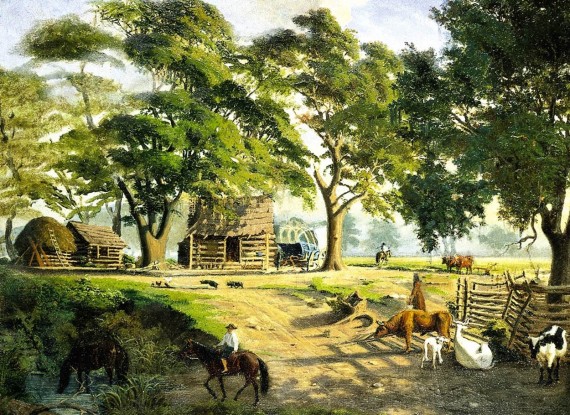How sweet are the sounds from home. How soothing the consolations of a discerning wife. I was feeling bad and she knew it. My cogitations over the election news were by no means jubilant. Silent and sad, with the newspaper open on my knee, I had been looking dreamily at the flickering flames for about ten minutes while Mrs. Arp sat near me sewing a patch on a pair of little breeches, when suddenly she inquired:
“What did you expect Mr. Cleveland to do for you?”
“Nothing,” said I, “nothing at all; but then you see, my dear, its highly important that a Democrat should be at the head of the nation.”
She never looked up nor for a moment stopped the graceful jerk of her needle and thread as she again inquired:
“And what would a Democratic President do for you?”
“Well, nothing–nothing at all,” said I; “but then you see I feel interested in the success of our party and the promulgation of the great general principles of the Democracy. They are the hope of the country – the–the – ”
“Please tell me something about those great principles,” said she; “what are they?”
“Why, my dear, the great principles of our party are– they–are–the–why they are as old as the government. They underlie the foundation of Democratic institutions–they”–
“But what are they?” said she.
“Well, in the first place,” said I, “when Thomas Jefferson was President he disseminated and set forth those principles in a series of state papers that have established in the mind of American patriots a reverence for democratic government that”–
“But what are the principles?” said she.
“Well, as I was going to say, the democratic institutions of our country have contributed more to the preservation of life, liberty and happiness than all other causes combined; indeed the benefits that its adherents partake of are–they are”–
“Justification, adoption, and sanctification,” said she.
“No, not exactly; not to that pious extent,” said I. “An enumeration of all those great principles would require more time than–than–”
“Well, never mind, William, never mind,” said she affectionately; “I don’t want to take up your valuable time, but I’ve been suspecting, for a long time, that those principles were to get in office and draw big salaries, and live high without work, and I reckon one party can do that about as well as another; don’t you?”
“Well, yes, my dear; there is, I confess, some foundation for your suspicions; but then, you see, we are trying to nationalize the American people through a national party, and become once more in fraternal union, and–”
“Well, you can’t do that, William,” said she. “They never did like us and we never did like them. We needn’t have any more war, but we can be stately and distant like we have to be with nabors that are not congenial. [emphasis added] If I was you I’d let national politics, as you call it, alone, for it’s a jack o’lantern business and will never profit you. Look after your farm and your home affairs. You had better go out now and water the flowers in the pit, and see where Carl and Jessie are. The meal is nearly out, and you had better shell a turn of corn this evening, and while you are down there see if the old blue hen has hatched. Her time is about up. Stir around awhile and don’t be looking so far away.”
Blessed woman! I did stir ’round, and it made me feel better. I shall take no more interest in national politics until – well, until the next election. Consolation is a good thing. I’m going to be reconciled anyway and not give up the ship. Reckon I can stay at home and make corn and cotton, and frolic with the children, and ruminate on the uncertainties of life and bask in the sunshine of the family queen.
“I am afraid you are hankering after an office,” said she, “and that would take you away from home and leave me and the children alone. Office is a poor thing; when a man gets one, everybody is envious of him, and he has to give about half his salary to keep his popularity. We’ve got a good home, and we are getting along in years, and I think we had better stay here, and be as happy as we can. Don’t you, John Anderson, my Joe?” and she placed her little soft hand so gently and lovingly on my frosty brow, my reverend head, that I haven’t thought about office since. I’m going to camp right here. Dr. Talmage has been preaching a sermon lately on married folks, and he says it’s the way the women do that drives their husband off at night to the clubhouse, and the stores, and the loafing places about town; says they don’t sweeten up on ’em like they did before they was married–don’t come to the door to meet ’em–don’t play the piano, but sorter give up, and are always complaining about something, or scolding the children or the servants. Well, maybe that’s so to some extent, but my observation is that most of them fellers went to the clubhouses and loafed around before they were married. I’ve knowed men to quit home and go up town every night because they said they was in the way while the children were being washed and put to bed. My wife, Mrs. Arp, taught me a long time ago that a man could perform those little offices about as well as a woman, and if they are his children he ought to be willing to do it. There the poor woman sits and sews and nurses the little chaps all the day long, tying up the cut fingers and stumped toes, and doctoring the little tooth-ache, and leg-ache, and stomach-ache and fixin’ ’em something to eat, and helping ’em in a thousand little ways–while the lord of the house is chatting with his customers or sitting in his office with his feet upon a table or against the mantel-piece, and another feller just like him is doing the same thing, and they talk, and swap lies, and laugh, and carry on, and it’s “ha, ha, ha,” and “he, he, he,” and “ho, ho, ho;” and about dark he stretches and yawns and says, “Well, I must go home; it’s about my supper time;” and brother Talmage wants his poor wife to be a watching at the window and when she sees him coming she must run out and meet him ‘twixt the house and the gate, and kiss him on his old smoky lips and say, “Oh, my dear, my darling, I’m so glad you have come.” Well, that’s all right, I reckon, if a woman ain’t got nothing else to think about but fitting herself for heaven, but to my opinion a man ought to go home a little sooner than he does, and take a little more interest in things when he gets there.
Women are a heap better than men if they have half a chance. They were created better. They begin the world better in their infancy. Little girls don’t go round throwing rocks at birds and shooting slingshots at the chickens and running the calves all over the lot and setting the dogs on the barn cats and breaking up pigeons’ nests and all that. Never saw a boy that didn’t want to shoot a gun and kill something. It’s a wonder to me that these kind, tenderhearted girls will have anything to do with ’em, but it seems like they will, and I reckon it’s all right, but if I was a young marryin’ woman I would be mighty particular about mating with a feller round town who belonged to half a dozen societies of one sort or another and was out every night. If I wanted a man all to myself I would look out for some farmer boy who would take me to the country where there ain’t no clubs or Masonic lodge or Odd Fellows or Knights of Honor or Pythias or Scylla or Charybdis, or fire companies, or brass bands, or mardi grass, or pate defoi gras. I’d force him to love me whether he wanted to or not, for there wouldn’t be anything to distract his attention. But then, if a girl wants to fly round and be everybody’s gal, and have all sorts of a time, why then she’d better marry in town. It’s all a question of having one good man to love you, or a dozen silly ones to admire. But as I ain’t a woman, I suppose it’s none of my business.







I think Smith might be a cousin or so to Charly Reese.
Excellent piece, thanks for sharing these old treasures.